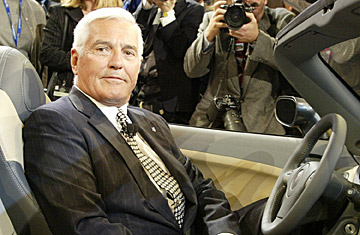
Former vice chairman of the Chrysler Corporation, Bob Lutz
WALTER ISAACSON, Managing Editor, TIME Magazine, Host: Welcome to the broadcast.
We're in Chicago at the beautiful art institute, and Charlie Rose is on the tarmac in Madison, Wisconsin, where he got stranded by his airplane.
So, I'm WALTER ISAACSON, the managing editor of TIME, and I'm filling in for Charlie Rose this evening.
This is the third in our series of discussions and debates about who are the most important people of our century. In early shows and issues of TIME, you may remember, we looked at the leaders, revolutionaries and politicians, and then we looked at the artists and entertainers.
Tonight we're gonna look at the business people — the builders and the titans of this century.
And with us tonight we have RAY BRADY, the chief economics correspondent of CBS — CBS will be doing a hour-long TV special based on the builders and titans we choose here tonight. We have DARLA MOORE, the very outspoken venture capitalist, banker and the woman that Fortune magazine called "the toughest babe in business"; NORMAN PEARLSTINE, the editor-in-chief of Time Incorporated; Bob Lutz, the former vice chairman of the Chrysler Corporation, who's worked for all three Detroit auto companies as well as BMW and is out with a great new book called Guts—
ROBERT A. LUTZ, Former Vice Chairman of Chrysler Corp., Author of "Guts": Thank you.
WALTER ISAACSON: —and finally GERALDINE LAYBOURNE, who is now the CEO of Oxygen Media, but is the former head of Nickelodeon and ABC Disney Cable.
OK, let's start with television. I mean, a lot people — Sarnoff, Paley, Ted Turner, whatever. If you had to pick the one person who had the most impact on television or the two people who had the most impact on television, tell us who you think it would be.
GERALDINE LAYBOURNE, Chairman & CEO, Oxygen Media: I guess I would pick Bill Paley and Ted Turner. And Bill Paley was really responsible for the invention of the television that we see today.
He innovated the sitcom format, variety shows. He created the best news organization at the time. I won't get into what the best news organization is today.
But he really set the gold standard, and he set a vision. He was a programmer first. And he was interested in creating a Tiffany network, and he set the bar high, which I think is the obligation of any of us.
WALTER ISAACSON: But, you know, you're speaking like a programmer. You're speaking like a content person.
The person who really created networks— Well, you're nodding, Bob.
ROBERT A. LUTZ, Former Vice Chairman of Chrysler Corp., Author of "Guts": Well, I looked at that same list. And I would look at it from outside the business as being a consumer and also, to some extent — I suppose — a provider of dollars for advertising.
But I would step back, and we have to watch out — as we look at this — that we're not caught up in who is— whom do we remember the best because it's much easier to look at personalities in the last 25 or 30 years than it is to look at people 30 to 50 years ago.
And that's where I would say Sarnoff to me was the— really both— had a major impact in the technological invention of television as well as beginning the pioneering task of popularizing it, and while—
WALTER ISAACSON: And he created networks, too. I mean—
ROBERT A. LUTZ: Yeah, exactly.
WALTER ISAACSON: He was the first person who said, "OK, let's pull it all together as a network.
ROBERT A. LUTZ: Yeah, and that's why I would— I think, as we look at this, we should be careful that we go back to the roots of who started it as opposed to who then built on it.
That would be my argument.
WALTER ISAACSON: Norm, are you—
NORMAN PEARLSTINE, Editor-in-Chief, Time Inc.: Well, at the risk of puffing Ted Turner, I think you have to say — who is now part of Time Warner — that beginning with a dream in CNN, taking it to everyone to try get funding, including the networks, including Time Inc., who turned him down, going off on his own and spending $30 million to establish a franchise that really now is a world brand right up there with Coca-Cola, arguably a better world brand than either CBS or NBC, would make him someone you'd have to pay special attention to.
WALTER ISAACSON: Darla, is there anybody you'd throw in the list here in terms of movies, television, financing of the movies, the business of it?
DARLA MOORE, President, Rainwater Inc.: One thing that strikes me is you talk about the builders of the networks, builders of the ideas, but at the time all this was discovered there were no televisions. There were no television sets.
And so everybody had a wonderful idea about how this new technology could work. But who was going to watch it? And who was going to look at it? And what kind of product was there going exist?
There were no television sets. So, I would go back even further than probably Bob and talk about who provided the capital and the wherewithal that ultimately allowed every American to have one or two television sets 'cause none of this would be of any value was there not the distribution mechanism, such as the TV for the people to watch.
